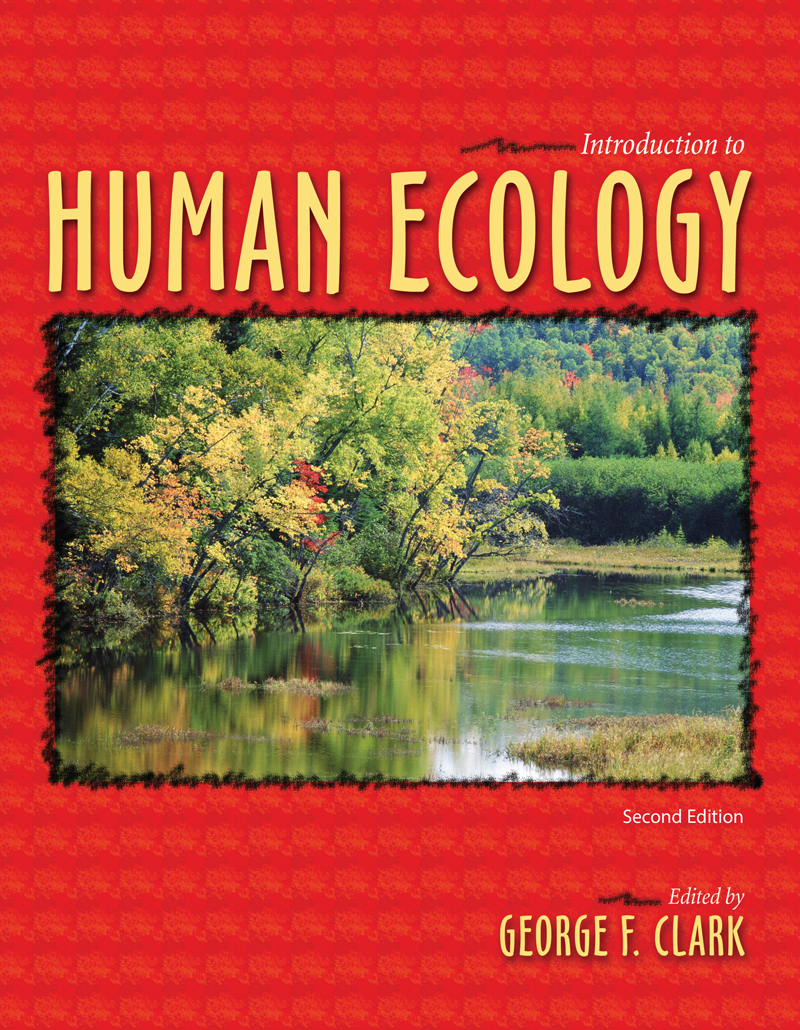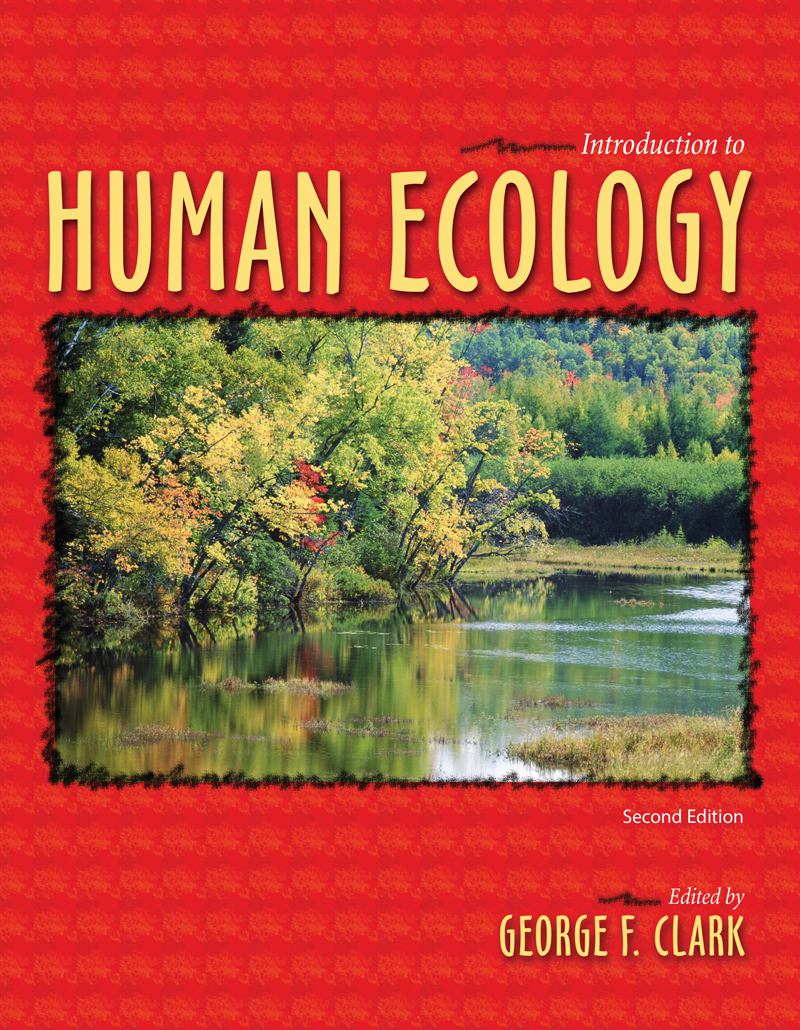Introduction to Human Ecology
Author(s): George F Clark
Edition: 2
Copyright: 2018
Pages: 338
Introduction to Human Ecology is a reader designed to accompany the course of the same name at Rutgers University and similar courses offered elsewhere. It provides articles illustrating basic human ecological concepts such as ethnocentrism, the commons, and cost-benefit analysis, offers a sample of environmental issues and problems, and does so using a diverse array of culture, disciplines and viewpoints. It is designed to give foundational knowledge, some new tools with which to think critically, and to stimulate thought via differing perspectives.
Introduction to Human Ecology
Section One
1. What Is Human Ecology? Bonnie McCay
2. If Scientists Want to Educate the Public, They Should Start by Listening Chris Mooney
3. Body Ritual among the Nacirema Horace Miner
4. The Mysterious Fall of the Nacirema Neil B. Thompson
5. Athapaskans along the Yukon Brad Reynolds
6. The Meaning of Adaptation Ann McElroy and Patricia K. Townsend
7. On New Guinea Tapeworms and Jewish Grandmothers Robert S. Desowitz
8. The Historical Roots of Our Ecologic Crisis Lynn White, Jr.
9. A Radical Vatican? Naomi Klein
10. China’s Religious Revival Fuels Environmental Activism Javier C. Hernández
11. Wrong to Monkey with Human Rights Russell Paul La Valle
12. How Do We Love Animals in Actuality? Alexus Lizardi
13. Speaking for Critters Who Can’t Speak B. G. Kelley
14. Why Perch a Bird on Your Shoulder? Albert DiBartolomeo
15. The Benefits of the Commons F. Berkes, et al
16. Conservation and Conceptions of the Environment: A Manus Province Case Study James Carrier
17. Interactions between People and Forests in East Kalimantan A. P. Vayda, et al
Section Two
18. The Truth about Genetically Modified Food David H. Freedman
19. GMOs/Nanofoods Food Empowerment Project
20. USDA Doesn’t Care if Our Diets Are Climate Friendly – But Americans Do John D. Sutter
21. Can Sustainable Agriculture Be Profitable? Patrick Madden
22. Energy Conservation in Amish Agriculture Warren A. Johnson, et al
23. Agricultural Change in Vietnam’s Floating Rice Region R.C. Cummings
24. Catalog of Woes Richard N. Mack
25. The Great Sisal Scheme Daniel R. Gross
26. Nutritional Ecology Bonnie McCay
27. Why People Go Hungry Kenneth J. Arrow
28. Facing Food Scarcity Lester R. Brown
29. What Are the Real Population and Resource Problems? Julian J. Simon
30. Growth in Population and Energy Consumption: More than a Matter of Interest Courtland L. Smith
31. Eating Fossil Fuels Dale Allen Pfeiffer
32. What’s Your Consumption Factor? Jared Diamond
Section Three
33. Deal Is Reached to Save California Redwood Forest Frank Clifford
34. Organizing for Sustainable Development: Conservation Organizations and the Struggle to Protect Tropical Rain Forests in Esmeraldas, Ecuador Thomas K. Rudel
35. Social Forestry for Whom? Vandana Shiva, et al
36. The Price of Everything Thomas Michael Power and Paul Rauber
37. Putting a Value on Environmental Quality John A. Dixon
38. Are People Acting Irrationally? Abraham H. Wandersman and William K. Hallman
39. Here’s How Scientific Misinformation, such as Climate Doubt, Spreads through Social Media Chelsea Harvey
40. The Polar Bear, Climate Change’s Poster Child, Ignites Controversy Jason Bittel
41. Effects of Social Media Use on Climate Change Opinion, Knowledge, and Behavior Ashley A. Anderson
42. National Priorities List Sites in New Jersey Environmental Protection Agency
43. Black Lung: The Social Production of Disease Barbara Ellen Smith
44. Multi-Party Responses to Environmental Problems: A Case of Contaminated Dairy Cattle George E. B. Morren, Jr.
45. America’s Apathy on the Environment Geneva Overholser
46. The Environment Is Improving Environmental Policy Alliance
47. Green Fatigue Susan Nielsen
48. The Elusive Process of Citizen Activism Celene Krauss
End Note
Introduction to Human Ecology is a reader designed to accompany the course of the same name at Rutgers University and similar courses offered elsewhere. It provides articles illustrating basic human ecological concepts such as ethnocentrism, the commons, and cost-benefit analysis, offers a sample of environmental issues and problems, and does so using a diverse array of culture, disciplines and viewpoints. It is designed to give foundational knowledge, some new tools with which to think critically, and to stimulate thought via differing perspectives.
Introduction to Human Ecology
Section One
1. What Is Human Ecology? Bonnie McCay
2. If Scientists Want to Educate the Public, They Should Start by Listening Chris Mooney
3. Body Ritual among the Nacirema Horace Miner
4. The Mysterious Fall of the Nacirema Neil B. Thompson
5. Athapaskans along the Yukon Brad Reynolds
6. The Meaning of Adaptation Ann McElroy and Patricia K. Townsend
7. On New Guinea Tapeworms and Jewish Grandmothers Robert S. Desowitz
8. The Historical Roots of Our Ecologic Crisis Lynn White, Jr.
9. A Radical Vatican? Naomi Klein
10. China’s Religious Revival Fuels Environmental Activism Javier C. Hernández
11. Wrong to Monkey with Human Rights Russell Paul La Valle
12. How Do We Love Animals in Actuality? Alexus Lizardi
13. Speaking for Critters Who Can’t Speak B. G. Kelley
14. Why Perch a Bird on Your Shoulder? Albert DiBartolomeo
15. The Benefits of the Commons F. Berkes, et al
16. Conservation and Conceptions of the Environment: A Manus Province Case Study James Carrier
17. Interactions between People and Forests in East Kalimantan A. P. Vayda, et al
Section Two
18. The Truth about Genetically Modified Food David H. Freedman
19. GMOs/Nanofoods Food Empowerment Project
20. USDA Doesn’t Care if Our Diets Are Climate Friendly – But Americans Do John D. Sutter
21. Can Sustainable Agriculture Be Profitable? Patrick Madden
22. Energy Conservation in Amish Agriculture Warren A. Johnson, et al
23. Agricultural Change in Vietnam’s Floating Rice Region R.C. Cummings
24. Catalog of Woes Richard N. Mack
25. The Great Sisal Scheme Daniel R. Gross
26. Nutritional Ecology Bonnie McCay
27. Why People Go Hungry Kenneth J. Arrow
28. Facing Food Scarcity Lester R. Brown
29. What Are the Real Population and Resource Problems? Julian J. Simon
30. Growth in Population and Energy Consumption: More than a Matter of Interest Courtland L. Smith
31. Eating Fossil Fuels Dale Allen Pfeiffer
32. What’s Your Consumption Factor? Jared Diamond
Section Three
33. Deal Is Reached to Save California Redwood Forest Frank Clifford
34. Organizing for Sustainable Development: Conservation Organizations and the Struggle to Protect Tropical Rain Forests in Esmeraldas, Ecuador Thomas K. Rudel
35. Social Forestry for Whom? Vandana Shiva, et al
36. The Price of Everything Thomas Michael Power and Paul Rauber
37. Putting a Value on Environmental Quality John A. Dixon
38. Are People Acting Irrationally? Abraham H. Wandersman and William K. Hallman
39. Here’s How Scientific Misinformation, such as Climate Doubt, Spreads through Social Media Chelsea Harvey
40. The Polar Bear, Climate Change’s Poster Child, Ignites Controversy Jason Bittel
41. Effects of Social Media Use on Climate Change Opinion, Knowledge, and Behavior Ashley A. Anderson
42. National Priorities List Sites in New Jersey Environmental Protection Agency
43. Black Lung: The Social Production of Disease Barbara Ellen Smith
44. Multi-Party Responses to Environmental Problems: A Case of Contaminated Dairy Cattle George E. B. Morren, Jr.
45. America’s Apathy on the Environment Geneva Overholser
46. The Environment Is Improving Environmental Policy Alliance
47. Green Fatigue Susan Nielsen
48. The Elusive Process of Citizen Activism Celene Krauss
End Note

